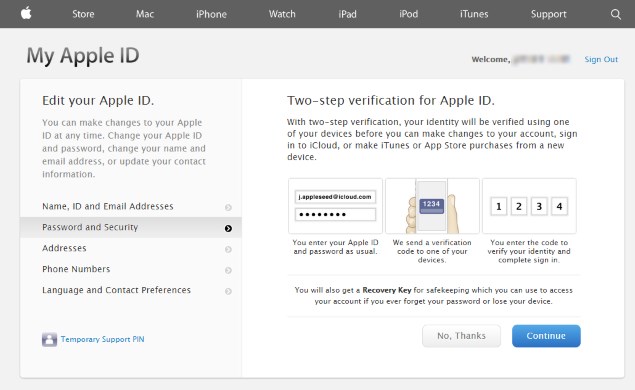- Home
- Internet
- Internet News
- Apple to Begin Enforcing Per App Passwords to Improve iCloud Security
Apple to Begin Enforcing Per-App Passwords to Improve iCloud Security
By NDTV Correspondent | Updated: 9 October 2014 16:05 IST

Click Here to Add Gadgets360 As A Trusted Source

Advertisement
Apple will roll out a change to its two-factor authentication measure which will allow users to easily manage apps that connect to iCloud and revoke permissions in case rogue behaviour is detected. Apple will generate unique passwords for apps that need to access a user's iCloud account for file storage or any other reason.
Users currently authorise apps using their iCloud passwords if they don't support two-factor authentication, and so Apple's new measure will give users an additional level of insulation. Since each authorised app has its own password, blocking its access becomes as simple as revoking the password, which can be done from the iCloud account management page on Apple's website. Apple has used the examples of Microsoft Outlook, Mozilla Thunderbird and BusyCal, which can all be tied in to a user's iCloud account.
The news was reported by 9to5mac, along with a copy of the official email sent out to Apple users reminding them that apps will need to be reauthorised to work with the new scheme. The measure was supposed to have come into effect on October 1, but was delayed.
Apple hopes to encourage users to turn on two-factor authentication, especially in light of a recent scandal in which the company was blamed when malicious attackers managed to gain access to celebrities' private accounts and steal private data including nude photos, which were then published on the Internet. While Apple took great pains to clarify that users' passwords were compromised rather than its own server security, it has since taken steps to improve account security.
iCloud users now receive notifications when their accounts have been accessed via a Web browser, and two-step authentication has been expanded to cover iCloud data, whereas it was previously only used to safeguard users' Apple account information.
iCloud storage pricing was also recently reduced, in an effort to match competitors and increase adoption of cloud storage.
Users currently authorise apps using their iCloud passwords if they don't support two-factor authentication, and so Apple's new measure will give users an additional level of insulation. Since each authorised app has its own password, blocking its access becomes as simple as revoking the password, which can be done from the iCloud account management page on Apple's website. Apple has used the examples of Microsoft Outlook, Mozilla Thunderbird and BusyCal, which can all be tied in to a user's iCloud account.
The news was reported by 9to5mac, along with a copy of the official email sent out to Apple users reminding them that apps will need to be reauthorised to work with the new scheme. The measure was supposed to have come into effect on October 1, but was delayed.
Apple hopes to encourage users to turn on two-factor authentication, especially in light of a recent scandal in which the company was blamed when malicious attackers managed to gain access to celebrities' private accounts and steal private data including nude photos, which were then published on the Internet. While Apple took great pains to clarify that users' passwords were compromised rather than its own server security, it has since taken steps to improve account security.
iCloud users now receive notifications when their accounts have been accessed via a Web browser, and two-step authentication has been expanded to cover iCloud data, whereas it was previously only used to safeguard users' Apple account information.
iCloud storage pricing was also recently reduced, in an effort to match competitors and increase adoption of cloud storage.
Comments
Catch the latest from the Consumer Electronics Show on Gadgets 360, at our CES 2026 hub.
Related Stories
Popular on Gadgets
- Samsung Galaxy Unpacked 2025
- ChatGPT
- Redmi Note 14 Pro+
- iPhone 16
- Apple Vision Pro
- Oneplus 12
- OnePlus Nord CE 3 Lite 5G
- iPhone 13
- Xiaomi 14 Pro
- Oppo Find N3
- Tecno Spark Go (2023)
- Realme V30
- Best Phones Under 25000
- Samsung Galaxy S24 Series
- Cryptocurrency
- iQoo 12
- Samsung Galaxy S24 Ultra
- Giottus
- Samsung Galaxy Z Flip 5
- Apple 'Scary Fast'
- Housefull 5
- GoPro Hero 12 Black Review
- Invincible Season 2
- JioGlass
- HD Ready TV
- Laptop Under 50000
- Smartwatch Under 10000
- Latest Mobile Phones
- Compare Phones
Latest Gadgets
- Honor Magic 8 RSR Porsche Design
- Honor Magic 8 Pro Air
- Infinix Note Edge
- Lava Blaze Duo 3
- Tecno Spark Go 3
- iQOO Z11 Turbo
- OPPO A6c
- Samsung Galaxy A07 5G
- Lenovo Yoga Slim 7x (2025)
- Lenovo Yoga Slim 7a
- Lenovo Idea Tab Plus
- Realme Pad 3
- Moto Watch
- Garmin Quatix 8 Pro
- Haier H5E Series
- Acerpure Nitro Z Series 100-inch QLED TV
- Asus ROG Ally
- Nintendo Switch Lite
- Haier 1.6 Ton 5 Star Inverter Split AC (HSU19G-MZAID5BN-INV)
- Haier 1.6 Ton 5 Star Inverter Split AC (HSU19G-MZAIM5BN-INV)
© Copyright Red Pixels Ventures Limited 2026. All rights reserved.







![[Sponsored] Haier C90 OLED TV | Dolby Vision IQ, 144Hz OLED and Google TV in Action](https://www.gadgets360.com/static/mobile/images/spacer.png)









